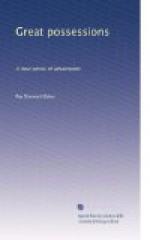John Templeton lived in one house for seventy-eight years; he was born there, and you will find the like of that in few places in America. It was a fine house for its time, for any time, and not new when John Templeton was born. A great, solid, square structure, such as they built when the Puritan spirit was virile in New England, with an almost Greek beauty of measured lines. It has a fanlight over the front door, windows exquisitely proportion, and in the center a vast brick chimney. Even now, though weathered and unpainted, it stands four-square upon the earth with a kind of natural dignity. A majestic chestnut tree grows near it, and a large old barn and generous sheds, now somewhat dilapidated, ramble away to the rear.
Enclosing the fields around about are stone fences representing the infinite labour of John Templeton’s forebears. More toil has gone into the stone fences of New England, free labour of a free people, than ever went into the slave-driven building of the Pyramids of Egypt.
I knew John Templeton in his old age—a stiff, weather-beaten old man driving to town in a one-horse buggy.
“How are you, Mr. Templeton?”
“Comin’ on, comin’ on.” This was his invariable reply.
He had the old New England pronunciation, now disappearing. He said “rud” for road, “daown” for down, and gave an indescribable twist to the word garden, best spelled “gardin.” He had also the old New England ways. He was forehanded with his winter woodpile, immaculately neat with his dooryard, determined in his Sunday observance, and if he put the small apples in the middle of the barrel he refused to raise tobacco, lest it become a cause of stumbling to his neighbour. He paid his debts, disciplined his children, and in an age which has come to look chummily upon God, he dreaded His wrath.
He grew a peculiar, very fine variety of sweet apple which I have never seen anywhere else. He called it the Pumpkin Sweet, for it was of a rich yellow. I can see him yet, driving into town with a shallow wagon box half full of this gold of the orchard; can see him turn stiffly to get one of the apples for me; can hear him say in the squeaky voice of age:
“Ye won’t find no sweeter apples hereabout, I can tell ye that.”
He was a dyed-in-the-wool abolition Republican and took the Boston Transcript for forty-six years. He left two cords of them piled up in a back storeroom. He loved to talk about Napoleon Bonaparte and the Battle of Waterloo, and how, if there had not been that delay of half an hour, the history of the world might have been different. I can see him saying, with the words puffing out his loose cheeks:
“And then Blooker kem up—”
To the very last, even when his eyes were too dim to read and his voice was cracked, he would start up, like some old machine set a-whirring when you touched the rusty lever, and talk about the Battle of Waterloo.




